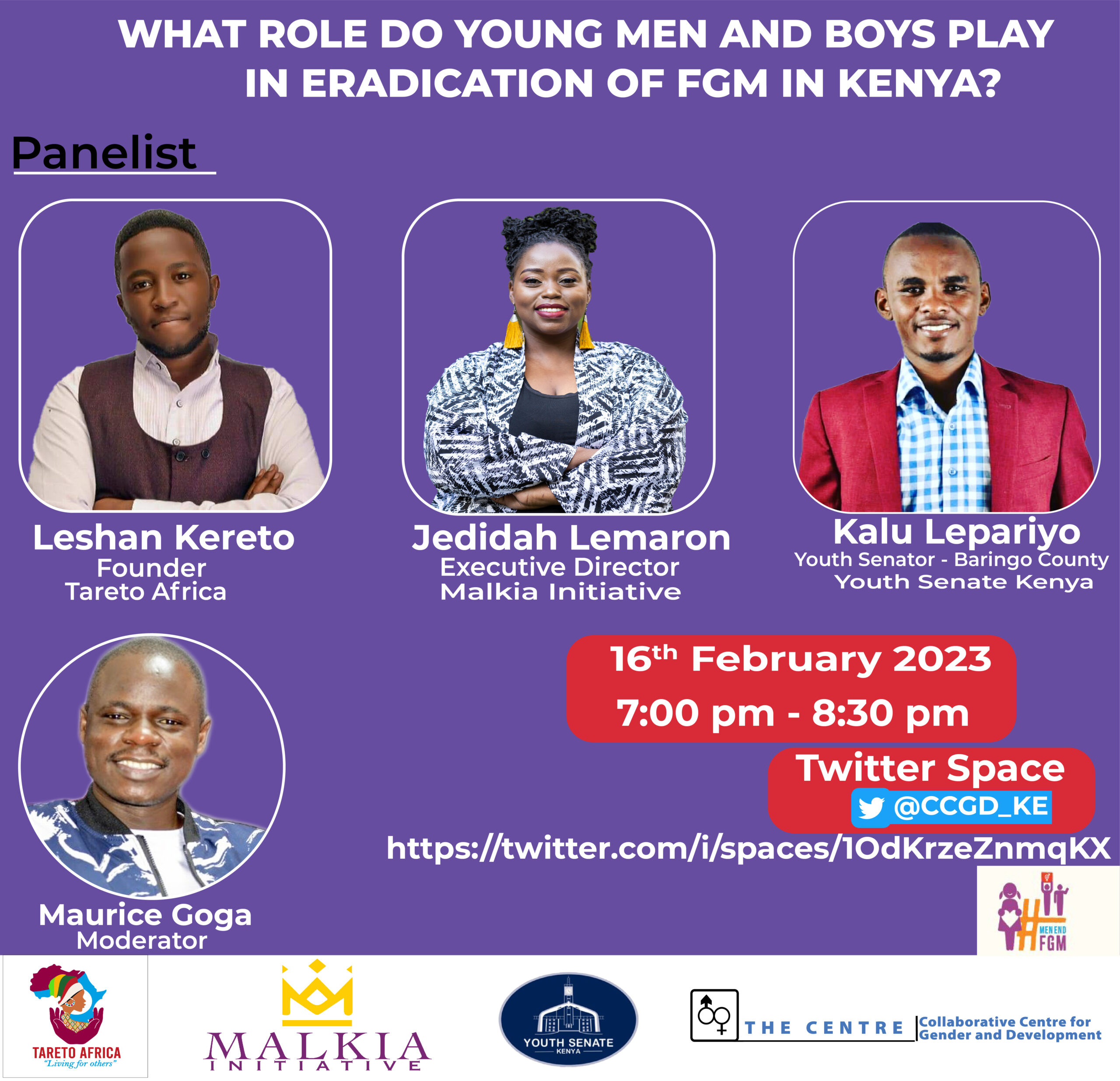The theme for the 2023 International Day for Zero Tolerance for FGM: ‘Partnering with men and boys to transform social and gender norms to end Female Genital Mutilation’ highlights the need for male engagement in lifting the voices of women and girls in the campaign to end FGM.
A 2020 study by the United Nations Population Fund-UNICEF Joint Programme on the Elimination of FGM found that 89 percent of boys and men and 92 percent of girls and women were opposed to FGM. Meaning for FGM to end, there is a need for actors to address social norms that perpetuate the practice of FGM with a key focus on the active involvement of men and boys as partners in ending FGM.
In line with the 2023 theme, Collaborative Centre for Gender and Development (CCGD) organized a Twitter Space on what role young men and boys play in the eradication of FGM in Kenya on Thursday, February 16, 203.
Speaking during the space, Baringo County Youth Senator, Kalu Lepariyo noted that the fact that the African setting is a patriarchal setting in nature disadvantages the women and girls since men play a pivotal role in cultural issues since they are the custodians of those cultural structures, beliefs and systems.
“Women have been disadvantaged and subjected to FGM and other cultural practices since they don’t have much say when it comes to cultural issues,” he said.
He added that the conversations around FGM have been a women’s affair for the longest time and men have been on the bench when it comes to such conversations. He, however, lauded the change that has been witnessed in the recent campaigns to end FGM where a number of young men have joined the campaign to end FGM in Kenya.
“It is now encouraging to see young men like my brother Leshan coming out clearly to challenge the government and other key stakeholders to take action against FGM. Others have even called for their involvement in advocacy against FGM,” he said.
The SDG5 champion called for the empowerment and education of women and girls as the way to emancipate them from the bondage of FGM and other harmful cultural practices.
On his part, the Chairperson of the UNFPA Youth Advisory Panel, Mr. Leshan Kereto noted women and girls often become vulnerable to FGM and other harmful cultural practices during conflicts and disasters such as drought.
“When drought strikes, young girls have to be given out for marriage to get back the cattle that have died. For this to happen, the girls have to be prepared for marriage through FGM,” he said.
The Executive Director of Malkia Initiative, Ms, Jedidah Lemaron said that involving men in the fight against FGM is very critical as they will play a role in advancing and promoting gender equality and empowerment of women.
Adding that the majority of girls from the FGM-practicing community are subjected to the cut because of the fear of not getting married as men from those communities usually fear marrying uncut women as a result of stigmatization from the community.
“We have been socialized to believe that if you are ‘uncut’ you will not get married, the fear of not getting married is what is pushing women and girls to undergo the cut,” noted Lemaron.
She called on the members of the community to work together to end FGM saying that men supporting women will create an environment where everyone’s voice will count especially in decision-making in matters affecting the community.
Lack of political goodwill from the local leaders for fear of losing votes during the general elections, cross-border FGM and the medicalization of FGM were also cited as some of the trends that still fuel FGM in Kenya.


